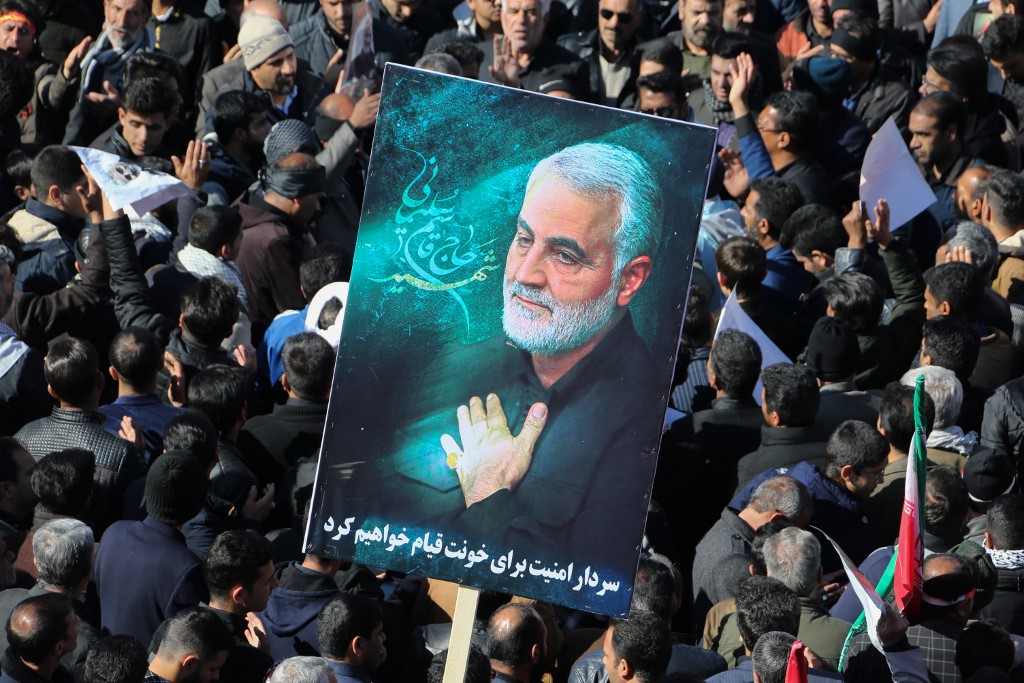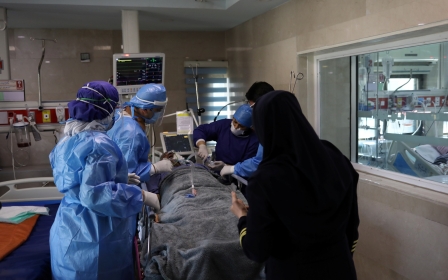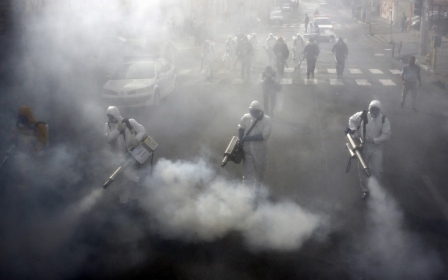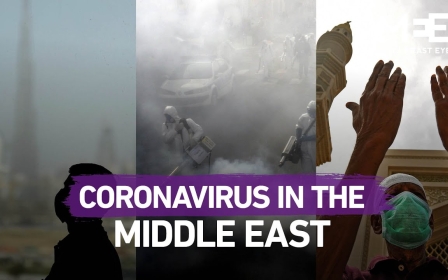Mourning alone: Iran's funeral traditions crumble in coronavirus isolation
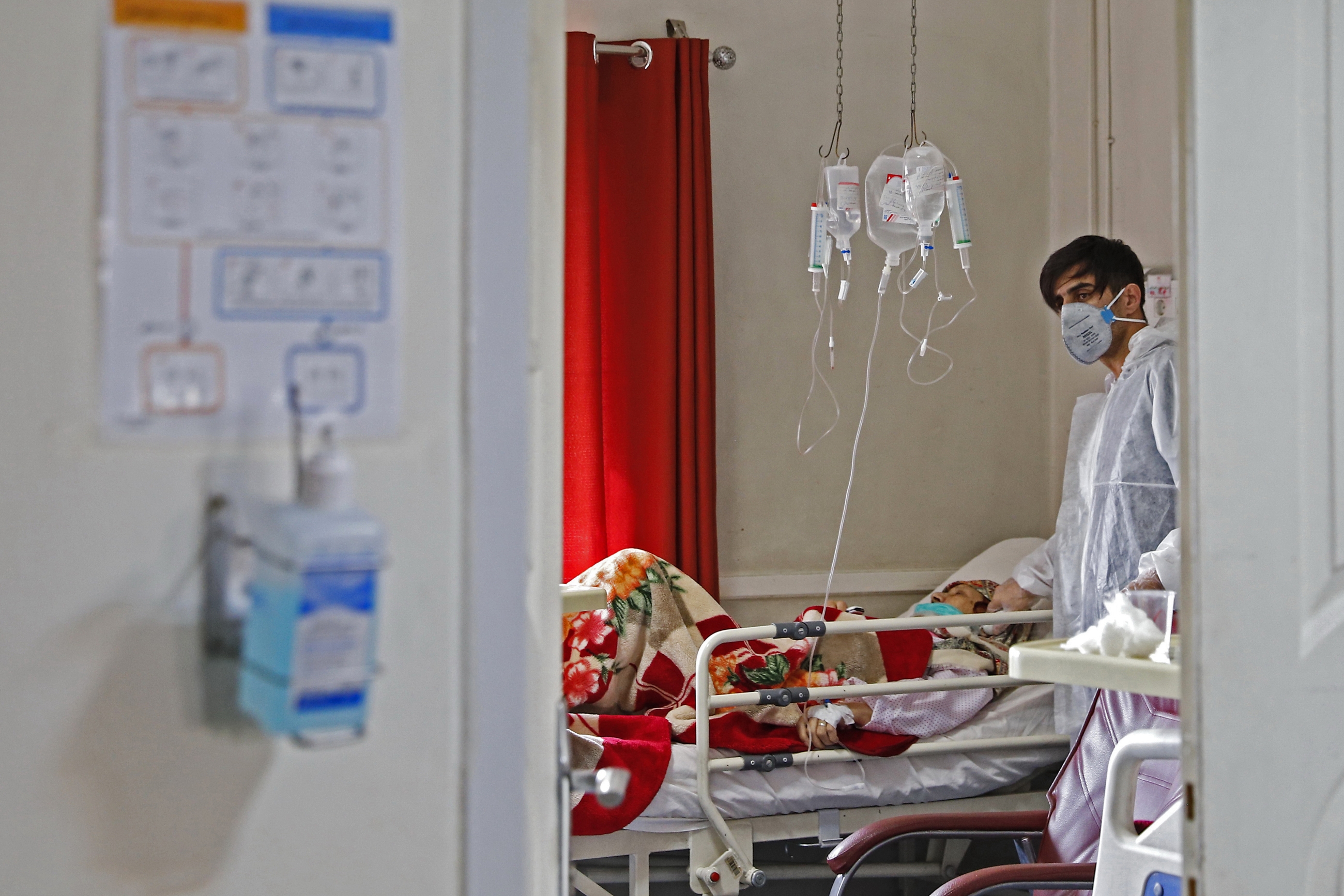
Of all the devastating consequences the coronavirus outbreak has brought to Iran, the most painful may well be the lone burial, at which the deceased is not allowed even a final hug from their loved ones to say farewell.
The country has been struggling with the worst Covid-19 outbreak in the Middle East, with more than 3,600 deaths reported.
Globally, as of Monday, the total confirmed cases of the coronavirus stands at almost 1.3 million, with deaths rising to over 70,000.
The arrival of the novel coronavirus has changed the way Iranians mourn the dead.
The coronavirus has taken away the one thing Iranians treasure the most at the end of life - to be surrounded by love
Under normal circumstances, ceremonies take place in a mosque or house and are attended by close and distant relatives alike. The mourners, usually 50 or more, pay their respects to the deceased and take part in the interment process and the next rites.
New MEE newsletter: Jerusalem Dispatch
Sign up to get the latest insights and analysis on Israel-Palestine, alongside Turkey Unpacked and other MEE newsletters
The most important task of the mourners is to offer emotional support to the family of the deceased and make sure that they are not left in solitude, which many believe deepens the pain of losing a loved one.
A lonely death
The coronavirus has taken away the one thing Iranians treasure the most at the end of life - being surrounded by the love of a large group of family and friends.
'There were other new graves in the cemetery, and like my son's, each was surrounded by only a few people'
- Mohsen Afrashteh
Reports of patients dying alone flood in from every corner of the world, all because of quarantine measures that prohibit contact in close proximity with the sick.
Only 12 people showed up for the burial of Reza Azizi’s friend, who had died of Covid-19.
“When they wanted to place him in the grave, we were told to keep a ten-metre distance from the grave as he had died of coronavirus,” Azizi told Middle East Eye.
“Two people in protection outfits buried him with lime while he was covered in a special type of plastic,” he added.
“We were also told by the cemetery not to bring flowers.”
Morteza Zarafshan described a similar experience at the funeral of his father, who died of Covid-19 three weeks ago.
“Three people from hospital, all wearing protective outfits, carried our father to his grave,” he told MEE, adding that the hospital advised that only two people should be present at the burial.
“We were told not to even get close to the grave, let alone hugging my dad for the last time,” Zarafshan said.
These days, the changes in internment rites apply to every death, not only limited to those who succumbed to the coronavirus.
Mohsen Afrashteh, 53, witnessed his son dying in the hospital two weeks ago from lung cancer. He was told to keep the number of attendees at the burial to a minimum.
“Only 12 or 13 people came to the cemetery to pay their condolences. We couldn’t even recite Fatiha near the grave of my son after he was laid to rest,” said Afrashteh, referring to the first chapter of the Quran.
“There were other new graves in the cemetery, and like my son's, each was surrounded by only a few people.”
Mourning in isolation
Many Iranians, now living in isolation to help contain the spread of the virus, are mourning alone.
“I feel lonely, and this loneliness has caused me to suffer more after the death of my father,” said Zarafshan.
“It was intolerable,” he told MEE, adding that the lack of proper mourning ceremonies for his father had deepened his pain. Following his father’s funeral, Zarafshan put himself in quarantine and lost frequent contact with his sisters, who were also self-isolating.
For Afrashteh, losing his son was painful, but the fact that so few people had shown up to pay him respect saddened him deeply.
'I feel lonely, and this loneliness has caused me to suffer more after the death of my father'
- Morteza Zarafshan
He “understood and accepted” that it was the right thing to do in order to contain the virus and “care for other people’s health”. But, he said, "the loneliness we faced in the last few days, with no relatives coming to see us, compounded our suffering.”
In the absence of traditional rites, Iranians have come up with new ways to alleviate their agony in the face of death.
Reza Azizi, whose closest friend died a few weeks ago, mourned his loss alongside the deceased’s family - virtually.
We created a video of my friend with a tragic song playing on it, and sent it to everyone on Telegram,” Azizi explained, referring to the instant messaging service.
“We also made a poster, asking all the family members, relatives and all those we knew to recite the Quran and Fatiha at a certain hour."
A ‘dangerous’ new reality
The lack of funerals for coronavirus victims has created a “dangerous phenomenon” in Iranian society, claimed Mehdi Mohsenian-Rad, a distinguished communications professor in Iran.
In an interview with a local news site, Mohsenian-Rad explained that visiting a patient's relatives during hospitalisation and the funeral that follows death "represent an important and positive rite of passage for those grieving their deceased".
It is important, he wrote, not to let a "feeling of loneliness and unbridled isolation" take hold of someone in mourning.
At this present moment, the sociologist argued, "there is a vacuum that needs to be addressed. Because in all traditional and modern societies, and in all cultures in different parts of the world, there are communicative rituals and traditions that are known to help reduce the apprehension and pain in those who have suffered a loss.”
Isolation and suicide
Close-knit networks of support are an indispensable part of life in Iran. But as Iranian society experiences “isolationism owing to the coronavirus”, it could also see a rise in suicides, warned Amanullah Gharai Moghaddam, a professor of sociology.
“Our society is emotional and eastern, and is intricately tied to our family and relatives. Therefore it is certain that those who have lost their loved ones are also enduring enormous pressure and sadness,” he told MEE.
Such social isolation could lead to more suicides, especially among those who are dealing with recent deaths in their circles, he said.
Gharai Moghaddam recommended using cultural activities to “increase hope in the society”, to prevent more loss of life.
“The TV channels should broadcast comedy shows and funny movies, which would encourage people to remember the sweeter side of life,” he said.
“We should also call our relatives and families to pay respect and express sympathy over their loss.”
There might, Gharai Moghaddam suggested, be a silver lining to this horrible crisis.
As grief spreads across Iran, the shared suffering could serve as a boost to people’s morale, because mourners would realise that they are not alone in this experience, and therefore feel less lonely.
Middle East Eye delivers independent and unrivalled coverage and analysis of the Middle East, North Africa and beyond. To learn more about republishing this content and the associated fees, please fill out this form. More about MEE can be found here.


